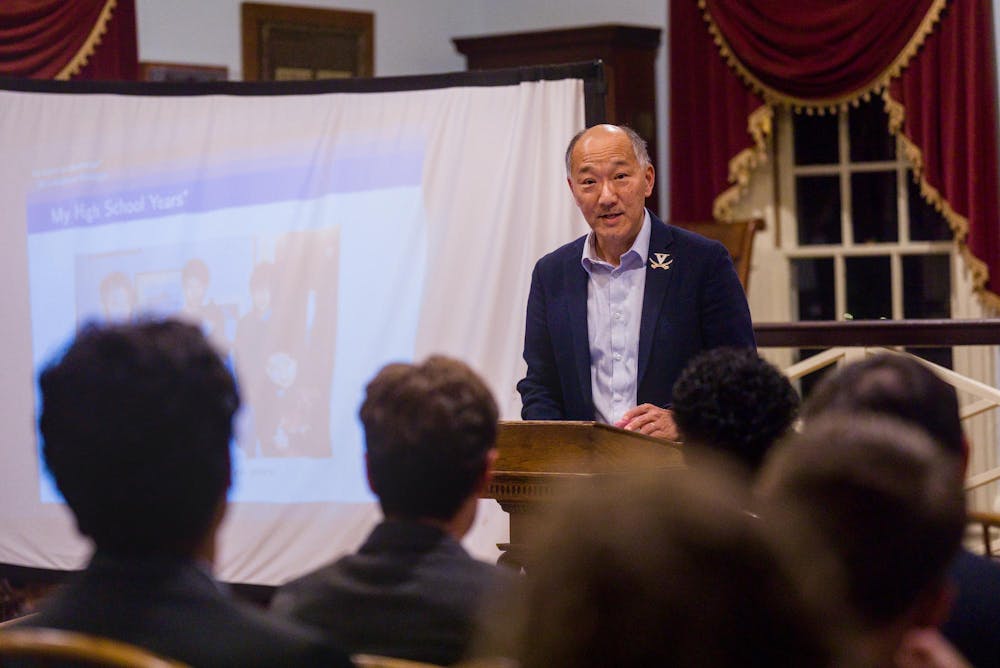Ken Ono, STEM advisor to the provost and professor of mathematics, joined the Jefferson Literary and Debating Society’s Distinguished Speaker Series Friday evening to share his journey to becoming the mathematician he is today. At the event, Ono presented to members about his life and his studies of mathematics.
The Jefferson Society is a student organization focused on discussion of a broad range of members’ interests, which periodically invites faculty, community members and other accomplished individuals to speak at weekly meetings as part of its Distinguished Speaker Series. At the first event of this series for the fall semester, the group featured Ken Ono, a mathematician whose research focuses on number theory. At the meeting, Ono spoke about his life and offered advice to students in attendance.
“I'm actually not proud of the student that I was in high school and college, but I'm proud of the way that this path allowed me to recognize what really matters and what really matters is choosing the subject that feels right, that meshes well and is in sync with my talents and that I'm really passionate about,” Ono said.
As a child who was gifted in math, he participated in a study at Johns Hopkins University led by Julian Stanley. He was offered admission and a full-ride scholarship to Towson University in seventh grade.
In his journey to becoming a mathematician, Ono said high school was the first time he learned about Srinivasa Ramanujan, a self-taught mathematician who made groundbreaking discoveries in the field. According to Ono, his contributions, along with those of the British mathematician G.H. Hardy, have had numerous applications that have shaped our modern world.
"Together, [Hardy and Ramanujan] innovated vast tracks of mathematics which both boast, today, a breathtaking legacy, solutions to ancient mathematical mysteries, breakthroughs in physics and ideas which help power the internet, to name a few," Ono said.
Although he dropped out of high school, Ono called on his connection with Stanley to help him get into the University of Chicago, which he joined in 1985.
At the University of Chicago, Ono began to struggle academically. He could no longer rely purely on his memory and math skills to get through class. He turned his academics around after watching a PBS documentary which led him to realize the importance of taking advantage of the opportunities available to him.
“[Subrahmanyan Chandrasekhar is] a Nobel Prize winner. He was interviewed in this show, and it was awesome, because I'd walked by him probably several dozen times, and I thought, ‘I'm in a special place, and I am messing up. I'm at the University of Chicago, where people get on television for telling these inspiring stories, and I am messing up,’” Ono said.
In his senior year, Ono made sure to put in as much effort as possible into his studies, especially in math. It was there that he met Professor Paul Sally. They connected as they were both fans of Ramanujan, but Professor Sally dropped out of college. Ultimately, their bond grew so strong that he helped Ono get into University of California, Los Angeles for his Ph.D.
At UCLA, Ono worked with Basil Gordon, another professor who loved Ramanujan. Together, they read “The Man Who Knew Infinity: A Life of the Genius Ramanujan.” After reading more about Ramanujan, Ono decided to base his thesis on the modern implications of Ramanujan’s work. Some of the faculty at UCLA thought Ono’s research would be pointless, and he would be better off working with them.
When it came time for Ono to present his thesis, he began to feel impostor syndrome. In hindsight, he realizes that he should have been much more confident in his thesis and his skills.
“The reality is, I wrote my thesis. Who's going to know my thesis better than me after I've written it? And I didn't understand that. I literally, not only could I not understand it, I couldn't believe and have the confidence that that would be true.” Ono said.
After Ono finished his thesis, Fermat’s Last Theorem was solved. It had gone unsolved for over 350 years and when it was finally solved, it used the theory of Galois representations, something Ono worked on in his thesis, making him one of the few people who could make sense of the proof.
“If you know anything about the proof of Fermat's Last Theorem, you know very few people could check it when it came out. It was like 10 people on the planet could understand any of it,” Ono said. “I went from not being able to get a job at all … to one of the 10 people on the planet that could make any sense out of this proof.”
Since then, Ono has been given several awards and has been granted many prestigious positions. Among them is the Presidential Early Career Award for Scientists and Engineers from President Bill Clinton in 2000. He joined the University’s faculty in 2019.
Victor Cortijo Lopez, member of the Jefferson Society and first-year College student, was especially moved by what Ono shared. He found the story fascinating and thought it was so special to be at a university where people as accomplished as Ono teach and serve.
“I think it really just speaks towards the legacy at U.Va., and being able to walk the halls with people who have been awarded by presidents … I think it's just an honor and continuous honor to be here at the University, being able to walk amongst them.” Cortijo Lopez said.







